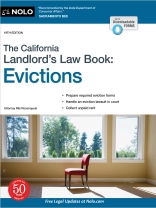Your step-by-step guide to evicting a problem tenant in California
Sooner or later, nearly every residential landlord has to evict a tenant for nonpayment of rent, property damage, an illegal sublet (including Airbnb), or another violation of the lease or the law.
You don’t always need to hire a lawyer, but you do need reliable information, particularly if your property is under rent control. Here, you’ll find all of the downloadable forms you need along with clear, step-by-step instructions on how to: Find out how to:
- prepare nonpayment of rent notices
- prepare 3-, 30-, 60-, and 90-day notices
- complete and serve all required eviction forms
- deal with tenants’ delaying tactics, and
- file your “unlawful detainer” complaint in court.
Just filing an eviction lawsuit often prompts the tenant to leave. If it doesn’t, you’ll learn how to:
Зміст
1. Evictions in California: An Overview
2. Eviction for Nonpayment of Rent
3. Eviction by 30-Day or 60-Day Notice
4. Eviction for Lease Violations, Property Damage, or Nuisance
5. Eviction Without a Three-Day or Other Termination Notice
6. Filing and Serving Your Unlawful Detainer Complaint
7. Taking a Default Judgment
8. Contested Cases
9. Collecting Your Money Judgment
10. When a Tenant Files for Bankruptcy
Appendixes
A. Rent Control Chart
B. How to Use the Interactive Forms
C. Forms
Index
Про автора
Nils Rosenquest has practiced housing, landlord-tenant, real estate, and business law for more than 35 years on behalf of individual landlords and tenants, small businesses, and community organizations. AV rated by Martindale Hubbell, he practices in all state and federal courts in California, and the United States Court of Appeals for the Ninth Circuit. He is also admitted to the United States Court of Claims and the United States Tax Court. In addition to helping private individuals and companies in housing and community matters, he represents non-profit subsidized housing developers and non-profit live-work communities. Apart from his law practice, he serves on the board of directors for the Chinatown Community Development Center, Inc., which supports subsidized housing and community development in San Francisco; volunteers at the San Francisco Superior Court in three departments; and teaches legal continuing education classes from time to time.












